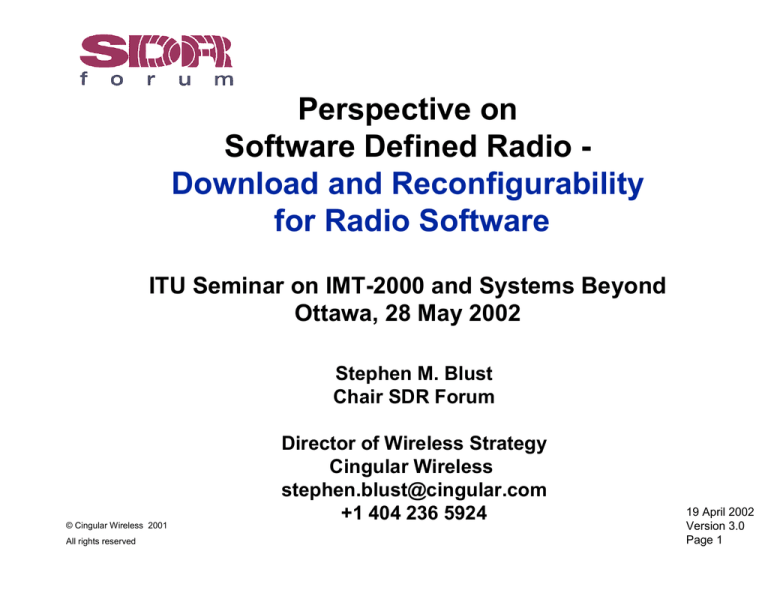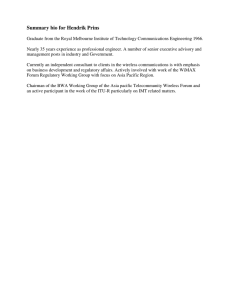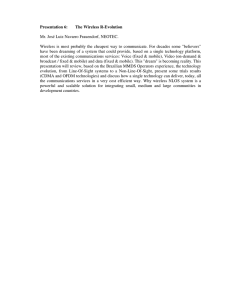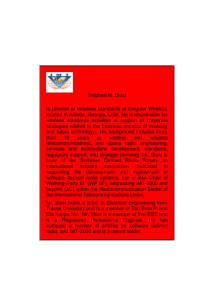
Perspective on
Software Defined Radio Download and Reconfigurability
for Radio Software
ITU Seminar on IMT-2000 and Systems Beyond
Ottawa, 28 May 2002
Stephen M. Blust
Chair SDR Forum
© Cingular Wireless 2001
All rights reserved
Director of Wireless Strategy
Cingular Wireless
stephen.blust@cingular.com
+1 404 236 5924
19 April 2002
Version 3.0
Page 1
Contents
Contents
Why “Download” in a Radio Software Context
Aspects of Radio Hardware, Radio Software, and Radio Software Download
SDR Forum Deliverables on Download
Summary
Appendix of Reference Information of SDR Forum
(Note: The Appendix material will not be spoken about in the presentation but is included as a
reference section)
© Cingular Wireless 2001
All rights reserved
19 April 2002
Version 3.0
Page 2
Why
Why “Download”
“Download”
in
in aa
Radio
Radio Software
Software Context
Context
and
and
Why
Why Now?
Now?
© Cingular Wireless 2001
All rights reserved
19 April 2002
Version 3.0
Page 3
The ‘Why”
• Industry Critical Aspect for Future Business Success
• Right Timing for Marketplace, Technology &
Regulatory
• Radio Software Download can be in standards as
required and in products to hit mass deployment cycle
of 3G – must start NOW!
• Best suited to SDR Implementations and also
applicable to many Non-SDR Implementations
In short: We as a wireless industry will need this to survive
in the increasingly competitive marketplace as we field
evermore complex systems built to complicated standards
developed by committee for rapid time to market – We don’t
have the time and money do keep doing products over and
over again until we get it right!
© Cingular Wireless 2001
All rights reserved
19 April 2002
Version 3.0
Page 4
SDR Forum Commissioned Study by Gartner Group
(Jan/02) - One Key Finding • The open-ended question on the benefit of SDR resulted in a
broad set of responses
– Wireless operators believe that SDR
technology will have a great benefit in fixing
bugs in handsets
– Military groups identified the key benefits of SDR
as “Interoperability”, “Cost Effectiveness” and
“Flexibility”
– Civil groups believe that SDR will bring “New
Services”, “Access to Multiple Frequencies” and
“Third-party Applications”
– Vendors see SDR as an opportunity for cost
reduction and device flexibility
© Cingular Wireless 2001
All rights reserved
19 April 2002
Version 3.0
Page 5
Key Findings - Reconfigurability
• Premise:
– SDR will allow operating parameters of base stations
and devices to be modified remotely, including software
corrections
• Conclusion:
– Wireless operators and vendors see software “bug
fixes” as most important
• Other identified factors were “Remote Re-flash”
of devices and “Over-the-air provisioning”
– Military groups see “Remote Network
Management” as most important
– Civil groups referred to “Over-the-air provisioning”
and “Band Compatibility”
© Cingular Wireless 2001
All rights reserved
19 April 2002
Version 3.0
Page 6
A3: Wireless Operators - SDR Benefits •
Q4: Benefits of using SDR in devices
– Bug fixing was the sole top choice
by all operators - US and Europe
– Update handsets in the field
– Avoid recalls / exchanges
– US operators gave multiple
standards a slightly higher rating
than Europe
– Nice to have feature, not mandatory
– All operators concerned that a
software OS in handsets will raise
power consumption and handset
size.
– Operator priorities for handsets are
long battery life and small size
Devices
Europe
US
2
3
New services
Air interface
flexibility
Protocol
enhancem ents
Multiple
frequencies
Multiple
protocols
Third party
applications
Bug fixing
0
1
4
Rating scale of 1-5
Low priority
High priority
Bug
Bugfixing
fixingisisthe
theclear
cleartop
topchoice
choicedriven
drivenby
bythe
theneed
needto
tosmooth
smooth
the
theintroduction
introductionof
of2.5/3G
2.5/3Gservices
services
© Cingular Wireless 2001
All rights reserved
5
19 April 2002
Version 3.0
Page 7
Aspects
Aspects of
of
Radio
Radio Hardware
Hardware
Radio
Radio Software
Software
and
and
Radio
Radio Software
Software Download
Download
© Cingular Wireless 2001
All rights reserved
19 April 2002
Version 3.0
Page 8
Definitions
• Radio Hardware
– The basic hardware within a wireless device that performs
the radio interface functions and includes the radio RF as
well as baseband signal processing.
• Radio Software
– The primary software within a wireless device that is
married with the radio hardware to derive the overall “radio”
functionality. Ancillary software (such as control) that may be
needed as a consequence of the primary software is an
inherent part of this definition. Radio software is not to be
confused with user applications, content and the like.
• Radio Software Download
– The process of delivering information to a wireless device to
alter the post manufacture operation, performance, or
capabilities by causing changes in the radio hardware or
software
Note: These definitions do not presume any particular method of implementation although SDR
implementations may be more amenable to enjoying the benefits of these concepts.
19 April 2002
© Cingular Wireless 2001
All rights reserved
Version 3.0
Page 9
Note: In this perspective the Radio
Implementers’ Plane is intended to be
more of a physical representation
viewpoint that encompasses either a
radio base station or a terminal
(handset) or both.
User Request for
New Service or
Capability
s
ion
t
a
ic
ppl
A
r
ne
Use
Pla
System Control
ers
d
i
v
Pro
e
vic
r
e
ne
S
Pla
e
Fr
tor
a
r
pe
O
or k
w
t
ne
a
l
Ne
P
qu
,
cy
en
w
Po
,
er
od
M
© Cingular Wireless 2001
All rights reserved
Radio Software
..
n.
Download
io
at
ul
Software
dio ers’
a
R ent
l em
p
Im
ne
a
l
P
19 April 2002
Version 3.0
Page 10
Scope within the Software Based Radio “Box”
from receiver
portion of
handset
to receiver portion of
handset
Software Signal Processing
Antenna may be
active or passive
system
RF Section of Transmitter
T/R
Switch
RF Power
Amplifier
& Filtering
IF and Baseband Section
Software
Defined
Processing
Engine
RF Front End
Processing
Engine
D/A
Software Control Processing Engine
A/D
I/O
ManMachine
Interface
Information from mobile network infrastructure
Available RF bands
Available air protocols
Propagation data
User needs
Minimum performance requirements
Etc.
© Cingular Wireless 2001
All rights reserved
Note:
This functional block diagram has been
simplified for illustrative purposes.
19 April 2002
Version 3.0
Page 11
Radio Hardware and Radio Software Combinations
• Initial radio hardware and radio software set tested
together at time of initial manufacture
– Parameters “established” at time of manufacture
• Initial type approval, type acceptance, conformance declaration,
etc….
Business as usual (?)
• Initial radio hardware and revised radio software post
manufacture emplaced in device via download
• What is the list of considerations?
• Revised radio hardware and revised radio software
• What is the list of considerations?
© Cingular Wireless 2001
All rights reserved
19 April 2002
Version 3.0
Page 12
Radio HW and SW Download Environments
• Local Environment
–
–
–
–
Attached cable,
Infrared,
Bluetooth,
etc
but not over the radio interface
• Remote Environment
– Over-the-air
via the actual radio interface in the device
through the supporting core radio network
© Cingular Wireless 2001
All rights reserved
19 April 2002
Version 3.0
Page 13
Considerations for Radio Software Download
• Can be categorized in three distinct stages
– Pre Download
– During Download
– Post Download
(preparatory)
(procedural)
(installing)
• Each stage has a set of concerns that must be
addressed both individually and collectively
• Common and standardized global solutions for these
concerns preferred by stakeholders
–
–
–
–
© Cingular Wireless 2001
All rights reserved
Manufacturers
Regulators
Network Operators and Service Providers
Users
19 April 2002
Version 3.0
Page 14
What are the implications and tasks?
• Developments in the field of testing of radio hardware
and radio software combinations
• Developments of download standards for radio
software to be globally accepted and common across
differing radio air interfaces and core networks to
address
– the combinations (revised sw or revised hw/sw)
– the environments
– the three stages (pre, during, and post download)
How do the combinations, environments and
stages relate and cause the download solutions
to be altered or different in design and definition?
© Cingular Wireless 2001
All rights reserved
19 April 2002
Version 3.0
Page 15
Pre-Download Stage Implications
• Has a measure of controllability and can be queried
and communicated with
• Security and integrity of the radio hardware and
software in current configuration
– What has been done by whom and when and why in the
past
• Knowledge of the state, function, vintage and status
of radio hw/sw in current configuration
– verification and auditing
• Etc…….
© Cingular Wireless 2001
All rights reserved
Process, protocols, procedures…..
19 April 2002
Version 3.0
Page 16
During Download Stage Implications
•
•
•
•
•
Integrity
Authentication
Security
Non-repudiation
Etc…….
Process, protocols, procedures…..
© Cingular Wireless 2001
All rights reserved
19 April 2002
Version 3.0
Page 17
Post-Download Stage Implications
•
•
•
•
•
•
•
Validation of downloaded software
In-situ testing
Mechanisms to switch from old to new
Means to revert back
Auditing
Traceability
Etc…….
Process, protocols, procedures…..
© Cingular Wireless 2001
All rights reserved
19 April 2002
Version 3.0
Page 18
SDR
SDR Forum
Forum Deliverables
Deliverables on
on Download
Download
© Cingular Wireless 2001
All rights reserved
19 April 2002
Version 3.0
Page 19
Download WG
Mr. Jim Hoffmeyer – Western Telecom Consulting Inc.
Deliverable:
•
•
•
•
•
•
•
Defining download of
software for reconfiguration
in a technical and regulatory
context
Global radio technology
development for software
download
Download timelines
Global regulatory views on
software download
Requirements for software
download for RF
reconfiguration
Download security and
integrity
Download solutions
© Cingular Wireless 2001
All rights reserved
Short Title and Date
•
DL-DFN) {6/2002}
•
(DL-GLO) {6/2002 & 9/2002}
•
(DL-TIM) {6/2002 & 9/2002}
•
(DL-REG) {6/2002 & 11/2002}
•
(DL-REQ) {6/2002}
•
(DL-SIN) {9/2002}
•
(DL-SOL) {9/2002}
19 April 2002
Version 3.0
Page 20
Download Deliverables Relationships
D L -D F N
D L -T I M
D L -R E Q
D L -S I N
D L -G L O
D L -R E G
D L -S O L
R e la tio n s h ip o f S D R F o r u m D o w n lo a d D o c u m e n ts
© Cingular Wireless 2001
All rights reserved
19 April 2002
Version 3.0
Page 21
SDR Forum Process
Identify User Needs
SDR Forum Member
Inputs
Industry and User Inputs
Understand Impact Areas
Dialog
Define Technical Concerns
& Standards Needs
N
SDR Forum Seeks
SDO to Accept
Ownership
N
Does SDO Exist for
Concern and Need
Y
SDR Forum Delivers
Standards Requirements
Document
Y
SDR Forum Develops
Standard Recommendation
SDR Forum Releases
Standard Recommendations to Industry
© Cingular Wireless 2001
All rights reserved
SDO Considers Input in
Standards Activities
SDO Develops & Releases
Standards to Industry
19 April 2002
Version 3.0
Page 22
Summary
Summary
© Cingular Wireless 2001
All rights reserved
19 April 2002
Version 3.0
Page 23
Summary (1)
•
The SDR Forum is addressing the real needs of SDR development as it
looks towards implementation and application of SDRs in a variety of
marketplaces.
• Download and reconfiguration are just one significant area of the
many that will be critical to the wireless industry.
•
The SDR Forum has an active technical specification and standards
development program.
• We invite infrastructure and terminal manufacturers, network
operators and service providers, etc. to participate in the download
work.
•
The SDR Forum continues an active program to promote public policy
decisions to facilitate SDR adoption and deployment.
• We will continue to assist regulators in understanding these
developments and in defining a coordinated global perspective on
SDR.
© Cingular Wireless 2001
All rights reserved
19 April 2002
Version 3.0
Page 24
Summary (2)
•
The SDR Forum is actively cultivating liaisons and interfaces with relevant
external organizations to facilitate the production of the standards for
developments such as Radio Software Download –
¾ Forum deliverables are the catalyst; embodying the requirements,
and will serve as a starting point for the initial elements of the
specifications…
¾ “Bits and Bytes” details are best addressed in relevant PPs, SDOs,
etc, through liaison activities of the Forum and with relevant
contributions from Forum members.
¾ “Global perspectives on SDR, in work such as that of the ITU-R
WP 8F and ITU-T SSG, is also required and appropriate.
© Cingular Wireless 2001
All rights reserved
19 April 2002
Version 3.0
Page 25
Appendix
AppendixA:
A:
General
GeneralInformation
Informationfor
forReference
Reference
© Cingular Wireless 2001
All rights reserved
19 April 2002
Version 3.0
Page 26
Mission and Charter
•
Mission
– Non-profit, international, open membership corporation
established in 1996 to accelerate the proliferation of
software-definable radio systems
•
Charter
– Develop and promulgate uniform requirements and
standards for SDR technologies
– Conduct cooperative research
– Prepare and disseminate informational materials
– Bring together interested parties to promote global
compatibility and interoperability in the wireless industry
– Cooperatively address the unique regulatory needs of
particular nations and market sectors while preserving
common platforms and methodologies
© Cingular Wireless 2001
All rights reserved
19 April 2002
Version 3.0
Page 27
SDR Forum Structure
Forum Officers
Board of Directors
Chief Operating Officer
(formerly known as the Steering Committee
Operations
Committee
Markets
Committee
© Cingular Wireless 2001
All rights reserved
Regulatory
Committee
Technical
Committee
Road Map
Task Group
19 April 2002
Version 3.0
Page 28
Technical Committee Detailed View
Markets
Committee
Regulatory
Committee
Technical
Committee
Road Map
Task Group
SDR Application Aspects (applying and using SDRs)
•Terminal and Network Architecture WG
•Security and Architecture WG
•Download WG
•System Interface WG
SDR Implementation Aspects (building SDRs)
•Research & Development WG
•SCA Reference Implementation Ad Hoc Group
© Cingular Wireless 2001
All rights reserved
19 April 2002
Version 3.0
Page 29
Download Working Group
Study principally the technical aspects of software
download to SDR devices, whether over-the-air or via other
means, and includes questions related to RF
reconfiguration of the equipment.
Develop and publish information regarding definitions,
requirements, concepts, timelines and other features of SDR
downloads for the wireless industry to stimulate and drive
the development of appropriate standards that address the
ability of software based radio devices to be reconfigured in
a proper manner subsequent to manufacture and/or
deployment
© Cingular Wireless 2001
All rights reserved
19 April 2002
Version 3.0
Page 30
SDR Forum Website
http://www.sdrforum.org
• Public Area
– General Forum information
– Meeting information
– Selected documents (including 2002 Unified Workplan Details)
• Member Area
– ID and Password required to access
– Reports and other deliverables
– Used for committee and working group
• Completed work
• Work in “ballot” review
• Work in progress
• Links of Interest
– General info
– Member company links
– Other
© Cingular Wireless 2001
All rights reserved
19 April 2002
Version 3.0
Page 31
Organization – Board of Directors
Stephen M. Blust
Cingular Wireless
Chair*
Ken Riordan
Motorola
Vice Chair*
Christian Serra
Thales
Vice Chair*
Peter Cook
Peter G. Cook Consultancy
Treasurer*
John Fitton
Harris Corporation
Secretary*
Mark Cummings
enVia
Chairman of the
Board*
Colin Phan
TRW
Markets Committee
Chair*
John Bard
Space Coast
Communications
Technical Committee Chair*
Dr. Bruce Fette
General Dynamics
Large Company
Representative
Jack Rosa
Hypres
Medium Company
Representative
Andy Feldstein
Innovative Concepts
Small Company
Representative
Calinel Pasteanu
Siemens
ITU Region 1
Claude Belisle
Communications
Research Centre
ITU Region 2
Richard Shrum
IITRI
Government/
Non-profit
Representative
Mike Chartier
Intel
Regulatory
Committee Chair
*Officer of the Forum
© Cingular Wireless 2001
All rights reserved
Stephen Hope
Orange PCS
Service Provider
Representative
Takuzo Fujii
Hitachi Kokusai
ITU Region 3
Vacant
At Large Representative
19 April 2002
Version 3.0
Page 32
Forum Demographics
© Cingular Wireless 2001
All rights reserved
19 April 2002
Version 3.0
Page 33
Members
NAFTA
Asia-Pacific
Europe
R. O. W.
Component Manufacturers
(handset, basestation , switch, satellite, h/w, s/w)
Network/Infrastructure Operators
(access, transmission, switching)
Wireless Service Providers
(network-based, re-sellers)
Application/Information Providers
(research orgs, trade journals, etc.)
Equipment Designers/Manufacturers
Industry Opinion Leaders
(local, state, national, regional bloc, international)
Government & Regulatory Agencies
(tool suppliers, chips, appliance hardware/software)
(h/w, s/w applications, packaging)
End Users
© Cingular Wireless 2001
All rights reserved
Source: SDR Forum
19 April 2002
Version 3.0
Page 34
Members Composition By Category
Gov’t &
Non-Profit
28%
32% Large
Current Members: 100
Medium
Small
10%
30%
Large Company - Revenues >100 million US dollars (USD
Medium Company - Revenues > 10 million and < 100 million USD
Small Company - Revenues < 10 million
Government and Non-Profit
As of 1Q 02
© Cingular Wireless 2001
All rights reserved
19 April 2002
Version 3.0
Page 35
Members Composition By Global Region
Region 3
27%
Region 1
21%
52% Region 2
ITU Region 1 - “Europe"
ITU Region 2 - “Americas”
ITU Region 3 - “Asia-Pacific”
As of 1Q 02
© Cingular Wireless 2001
All rights reserved
19 April 2002
Version 3.0
Page 36
Members Composition By Segment
20%
AR
OT
CM
13%
AP
5%
4%
EU
13%
11%
22%
NO/SP
12%
EM
CM & EM
AR - Academia and Research
AP - Application/ Information Providers
EU - End Users
NO/SP - Network Operators/Service Providers
CM& EM - Both Component & Equipment Designers/Manufacturers
EM - Equipment Designers/ Manufacturers
CM - Component Manufacturers
OT - Other
As of 1Q 02
© Cingular Wireless 2001
All rights reserved
19 April 2002
Version 3.0
Page 37
Meetings and Working Methods
• Five Major Meetings Per Year
– February - Winter Meeting, generally held in USA
– 5-7 February 2002
Dallas TX USA
– April - Spring Meeting, generally held in Asia-Pacific
region
– 16-18 April 2002
Tokyo, JAPAN
– June - Summer Meeting, generally held in USA
– 11-13 June 2002
Boston, MA USA
– September - Fall Meeting, generally held in Europe
– 18-20 September 2002
Edinburgh, SCOTLAND
– November – Regular +Annual Business Meeting+
Technical Conference generally held in USA
– 11-15 November 2002
© Cingular Wireless 2001
All rights reserved
San Diego CA USA
19 April 2002
Version 3.0
Page 38
2002 Software Defined Radio Technical Conference
and Product Exposition
http://www.sdrforum.org/sdr02/main.html
11, 12 November 2002 -- San Diego, California
The Software Defined Radio Forum will sponsor a technical conference and product exposition in San Diego on
11, 12 November 2002. This conference will focus on technology, standards, and business activity related to software radios and will
provide an international perspective of the current state of the art. Papers will be reviewed by both technical peers and business
leaders and only those with the best combination of technical innovation, technical quality, and potential for broad impact in practical
applications will be accepted.
The SDR community is invited to participate in this program and to share research results and the status of other activities. Some
suggested topics are presented below, but consideration will be given to papers on other relevant subjects. Proceedings of the
conference will be provided to participants.
1.0 Enabling
technologies
1.1 Apertures, 1.2 Hardware, 1.3 Software, 1.4 Firmware, 1.5 User &
I/O, 1.6 Circuits & Chips, 1.7 Waveforms
2.0 Integration with existing infrastructure
2.1 Networking/protocols, 2.2 Signaling, 2.3 SW download
3.0 System design
3.1 Security, 3.2 Stability, 3.3 Maintenance
4.0 System performance & optimization
4.1 Spectral efficiency, 4.2 Latency, 4.3 Management
5.0 Business model
5.1 User applications, 5.2 Retail, 5.3 Network operator,
5.4 Business model changes
© Cingular Wireless 2001
All rights reserved
6.0 Evolution of SDR technology
6.1 Commercial, 6.2 Military, 6.3 Civil,
6.4 Forthcoming products
7.0 Regulatory aspects of SDR
7.1 Global regulatory issues,
7.2 Effects on society
8.0 Market analysis
9.0 SDR research topics
9.1 Languages, 9.2 Development tools
10.0 Radio Virtual Machine
11.0 Tutorials
12.0 Other
19 April 2002
Version 3.0
Page 39
Biography
Stephen M. BLUST, P.E.
Director of Wireless Standards
Cingular Wireless
5565 Glenridge Connector
Suite 950
Atlanta, GA 30342 USA
Phone +1 404 236 5924
Fax
+1 404 236 5949
E-mail stephen.blust@cingular.com
BIOGRAPHY
Stephen M. Blust (P.E.) is Director of Wireless Standards at Cingular Wireless located in Atlanta, Georgia, USA.
He is responsible for wireless standards activities in support of corporate strategies related to the business
impacts of evolving and future technology. His background includes more than 30 years in wireline and wireless
telecommunications, and spans radio engineering, services and architecture development, standards, regulatory
support, and strategic planning. Mr. Blust is chair of the Software Defined Radio Forum, an international industry
association dedicated to supporting the development and deployment of software defined radio systems. He is
also Chair of Working Party 8F (WP 8F), addressing IMT-2000 and beyond (3G) within the Radiocommunication
Sector of the International Telecommunications Union
Mr. Blust holds a B.Sc. in Electrical Engineering from Tulane University and is a member of Tau Beta Pi and Eta
Kappa Nu. Mr. Blust is a member of the IEEE and is a Registered Professional Engineer. He has authored a
number of articles on software defined radio, and IMT-2000 and is a patent holder.
© Cingular Wireless 2001
All rights reserved
19 April 2002
Version 3.0
Page 40



